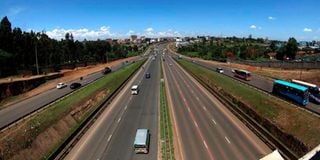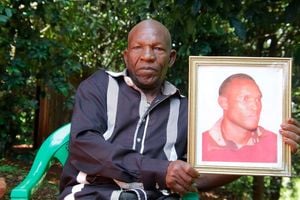
A section of the Thika superhighway.
The Kenya National Highways Authority (KeNHA) is proposing to introduce toll fees on some of the country's major roads, despite President William Ruto’s campaign pledge not to introduce such charges.
In a statement released on Tuesday, KeNHA said that a policy would be developed following extensive public participation to ensure that all stakeholders can contribute their views.
Read: Compensation of those displaced by construction of Horn of Africa Gateway Development project halted
Motorists plying Thika Superhighway, Southern Bypass, Nairobi-Nakuru-Mau Summit, Dongo Kundu Bypass and the Kenol-Sagana-Marua Road will be required to pay toll rates if the policy is adopted.
The authority added that the discussions were already underway to introduce the Road Tolling Policy on several roadways.
“The Authority assures the public that this policy will be developed with extensive public participation to ensure that all voices are heard. Once the Policy is finalized, it will guide which roads will be tolled,” the statement said.
It said that if the policy is passed after public participation, and a number of roads are successfully tolled, the Authority would use the revenue generated to maintain the same roads.
According to KeNHA, the toll fees would contribute to the repayment of loans used to fund major road projects, “supporting our long-term financial sustainability, like the loan that built Dongo Kundu Bypass”.
“This will free money collected from road levy for the construction of new roads, expanding our network and improving connectivity across the country. Through this approach, KeNHA is committed to creating a safer, more efficient road system for all Kenyans,” it added.
The tolling of the major highways was part of KeNHA’s 2023-27 strategic plan, already in force.
Campaign promise
During the run-up to the 2022 elections, President William Ruto said that Kenyans should not pay to use a road.
Speaking at one of his campaigns, Dr Ruto said his administration would explore other ways to repay infrastructure loans other than through the imposition of toll fees.
According to the Head of State, toll charges were implemented to meet financial obligations owed to contractors on roads such as the Nairobi Expressway that runs from Mlolongo to Westlands, placing a substantial tax burden on the poor.
“You don’t charge people for using a road… We are going to deploy the highway to be available to as many people as possible so that we can remove all the spaces where there is taxation. Taxation will be taken to products, not the highway,” Dr Ruto said during a town hall at Serena Hotel in July 2022.
In another about-turn, the government in January 2024 went back on its promise not to charge Kenyans to use the Nairobi Expressway.
Dr Ruto’s administration announced that motorists would pay more to use the tolled road which runs across Nairobi’s Central Business District.
Former Transports Cabinet Secretary Kipchumba Murkomen explained that the increased charges were as a result of a number of factors, including depreciation of the Kenyan shilling against the US dollar.
“The good thing about expressway is first that the government of Kenya did not give traffic volume guarantee otherwise the taxpayer would now be paying a lot from the interest accrued and inflation plus the difference unmet by less traffic flow,” Mr Murkomen said in a statement.
“Second, the consumer has an alternative route which is not tolled.”
Currently, the Nairobi Expressway is the only toll road in Kenya which is managed by the Moja Expressway Company.
The value of roads established under the Road Sector Investment Programme (2023-2027) is Sh4 trillion with a financing gap of Sh315 billion according to Kenya Roads Board.
The roads network has in the last eight years grown from 161,451 kilometres to 249, 122 kilometres reflecting an increase of 77,671 kilometres.







